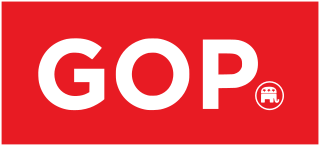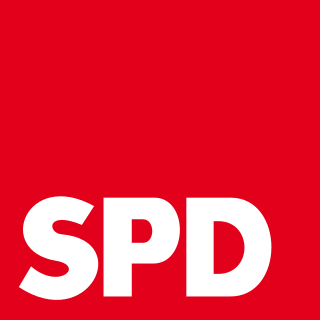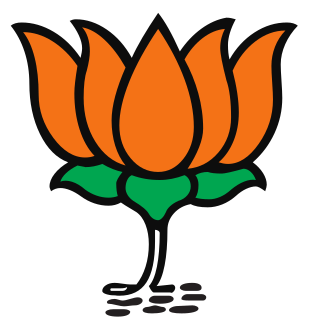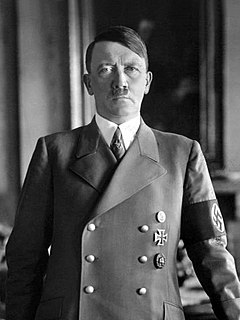
The Bolsheviks, also known in English as the Bolshevists, were a radical, far-left, and revolutionary Marxist faction founded by Vladimir Lenin that split with the Mensheviks from the Marxist Russian Social Democratic Labour Party (RSDLP), a revolutionary socialist political party formed in 1898, at its Second Party Congress in 1903.

The Chinese Communist Party (CCP), officially the Communist Party of China (CPC), is the founding and sole ruling party of the People's Republic of China (PRC). The CCP leads eight other legally permitted subordinate minor parties together as the United Front. The CCP was founded in 1921, mainly by Chen Duxiu and Li Dazhao, with the help of the Far Eastern Bureau of the Communist Party of the Soviet Union and Far Eastern Secretariat of the Communist International. The party grew quickly; by 1949 the Nationalist Government of the Kuomintang (KMT) had been driven from mainland China to Taiwan after the Chinese Civil War, leading to the establishment of the People's Republic of China on 1 October 1949.

The Nazi Party, officially the National Socialist German Workers' Party, was a far-right political party in Germany active between 1920 and 1945, that created and supported the ideology of Nazism. Its precursor, the German Workers' Party, existed from 1919 to 1920. The Nazi Party emerged from the German nationalist, racist and populist Freikorps paramilitary culture, which fought against the communist uprisings in post-World War I Germany. The party was created to draw workers away from communism and into völkisch nationalism. Initially, Nazi political strategy focused on anti-big business, anti-bourgeois, and anti-capitalist rhetoric. This was later downplayed to gain the support of business leaders, and in the 1930s the party's main focus shifted to antisemitic and anti-Marxist themes.

A political party is an organization that coordinates candidates to compete in a particular country's elections. It is common for the members of a party to hold similar ideas about politics, and parties may promote specific ideological or policy goals.

The United Kingdom is a unitary state with devolution that is governed within the framework of a parliamentary democracy under a constitutional monarchy in which the monarch, currently Queen Elizabeth II, is the head of state while the Prime Minister of the United Kingdom, currently Boris Johnson, is the head of government. Executive power is exercised by the British government, on behalf of and by the consent of the monarch, and the devolved governments of Scotland, Wales and Northern Ireland. Legislative power is vested in the two chambers of the Parliament of the United Kingdom, the House of Commons and the House of Lords, as well as in the Scottish and Welsh parliaments. The British political system is a two party system. Since the 1920s, the two dominant parties have been the Conservative Party and the Labour Party. Before the Labour Party rose in British politics, the Liberal Party was the other major political party, along with the Conservatives. While coalition and minority governments have been an occasional feature of parliamentary politics, the first-past-the-post electoral system used for general elections tends to maintain the dominance of these two parties, though each has in the past century relied upon a third party, such as the Liberal Democrats, to deliver a working majority in Parliament. A Conservative–Liberal Democrat coalition government held office from 2010 until 2015, the first coalition since 1945. The coalition ended following parliamentary elections on 7 May 2015, in which the Conservative Party won an outright majority of seats, 330 of the 650 seats in the House of Commons, while their coalition partners lost all but eight seats.

The Libertarian Party (LP) is a political party in the United States that promotes civil liberties, non-interventionism, laissez-faire capitalism, and limiting the size and scope of government. The party was conceived in August 1971 at meetings in the home of David F. Nolan in Westminster, Colorado, and was officially formed on December 11, 1971, in Colorado Springs, Colorado. The founding of the party was prompted in part due to concerns about the Nixon administration, the Vietnam War, conscription, and the introduction of fiat money.

The Republican Party, also referred to as the GOP, is one of the two major, contemporary political parties in the United States, along with its main historic rival, the Democratic Party.
The Conservative Party, officially the Conservative and Unionist Party, and also known colloquially as the Tories, Tory Party, or simply the Conservatives, is one of the two main political parties, and current governing party, in the United Kingdom, winning the 2019 general election with an overall majority in the House of Commons. The party is generally considered to sit on the centre-right of the political spectrum, and to be ideologically conservative. As a big tent party, it encompasses various ideological factions including one-nation conservatives, Thatcherites, liberal conservatives and conservative liberals. The party currently has 359 Members of Parliament, 258 appointed members of the House of Lords, 9 members of the London Assembly, 31 members of the Scottish Parliament, 16 members of the Welsh Parliament, 2 directly elected mayors, 30 police and crime commissioners, and approximately 7,500 local authority councillors.

The Social Democratic Party of Germany is a social democratic political party in Germany. It is one of the two major parties of contemporary Germany along with the Union parties (CDU/CSU).

The Bharatiya Janata Party is one of two major political parties in India, along with the Indian National Congress. It has been the ruling political party of the Republic of India since 2014. The BJP is a right-wing party, and its policy has historically reflected Hindu nationalist positions. It has close ideological and organisational links to the much older Rashtriya Swayamsevak Sangh (RSS). As of 2020, it is the country's largest political party in terms of representation in the national parliament and state legislatures.

The Indian National Congress, colloquially the Congress Party but often simply Congress, is a political party in India with widespread roots. Founded in 1885, it was the first modern nationalist movement to emerge in the British Empire in Asia and Africa. From the late 19th century, and especially after 1920, under the leadership of Mahatma Gandhi, Congress became the principal leader of the Indian independence movement. Congress led India to independence from the United Kingdom, and powerfully influenced other anti-colonial nationalist movements in the British Empire. Due to its enduring history, the Congress is often called the "grand old party".

Samajwadi Party is a social democratic political party in India, headquartered in New Delhi. It is mainly based in Uttar Pradesh, with significant presence in other states as well.
An independent or non-partisan politician is a politician not affiliated with any political party. There are numerous reasons why someone may stand for office as an independent.

Adolf Hitler was an Austrian-born German politician who was the dictator of Germany from 1933 until his death in 1945. He rose to power as the leader of the Nazi Party, becoming the chancellor in 1933 and then assuming the title of Führer und Reichskanzler in 1934. During his dictatorship, he initiated World War II in Europe by invading Poland on 1 September 1939. He was closely involved in military operations throughout the war and was central to the perpetration of the Holocaust, the genocide of about six million Jews and millions of other victims.

The Democratic Party is one of the two major, contemporary political parties in the United States. It was founded around 1828 by supporters of Andrew Jackson, making it the world's oldest active political party. Since the 1860s, its main political rival has been the Republican Party.

The Liberal Democrats are a liberal political party in the United Kingdom. The party has 13 Members of Parliament in the House of Commons, 84 members of the House of Lords, four Members of the Scottish Parliament, one member in the Welsh Senedd and two members in the London Assembly. The party served as the junior party in a coalition government with the Conservative Party between 2010–2015, with Scottish Labour in the Scottish Executive from 1999 to 2007, and with Welsh Labour in the Welsh Government between 2000 to 2003 and between 2016 to 2021.
The Labour Party is a political party in the United Kingdom that has been described as an alliance of social democrats, democratic socialists and trade unionists. The Labour Party sits on the centre-left of the political spectrum. In all general elections since 1922, Labour has been either the governing party or the Official Opposition. There have been six Labour prime ministers and thirteen Labour ministries.

The Uttar Pradesh Legislative Assembly is the lower house of the bicameral legislature of Uttar Pradesh. There are 403 seats in the house filled by direct election using a single-member first-past-the-post system.















